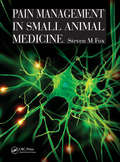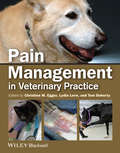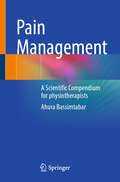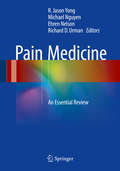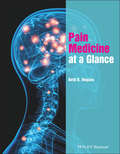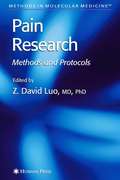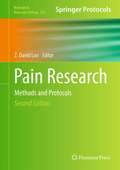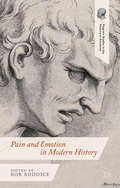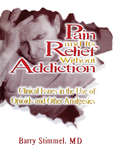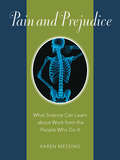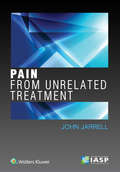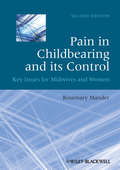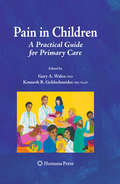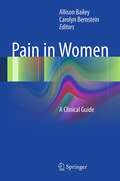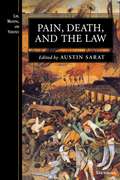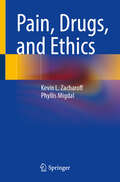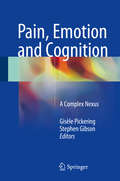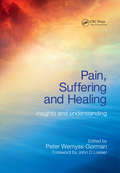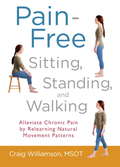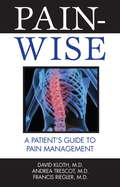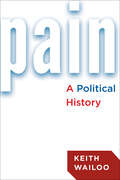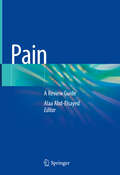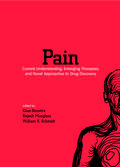- Table View
- List View
Pain Management in Small Animal Medicine
by Steven FoxPain Management in Small Animal Medicine describes and clearly illustrates the difficulties and choices facing veterinarians in identifying and treating pain, in addition to providing an account of the neurobiological mechanisms responsible for the pain. Expanded from the author's previous work, Chronic Pain in Small Animal Medicine, this volume us
Pain Management in Veterinary Practice
by Lydia Love Tom Doherty Christine M. EggerPain Management in Veterinary Practice provides veterinary practitioners with the information needed to recognize and manage pain in a wide range of large, small, and exotic animal species. Encompassing acute, adaptive, and chronic, maladaptive pain, the book provides an up-to-date review of the physiology and pathophysiology of pain. Pain Management in Veterinary Practice offers specific strategies for addressing pain in animals, including local and regional analgesia, continuous rate infusions, and novel methods of analgesic drug delivery.With comprehensive information on the pharmacokinetic and pharmacodynamic characteristics of analgesic drugs, the book goes beyond pharmaceutical options to incorporate scientific information on techniques for complementary treatment, including physical therapy, acupuncture, chiropractic techniques, and nutritional strategies. Pain Management in Veterinary Practice is a valuable resource for developing pain management protocols in the veterinary clinic.
Pain Management: A Scientific Compendium for physiotherapists
by Ahura BassimtabarThis textbook combines research findings with practical relevance for physiotherapists, sports scientists, and orthopedists in the management of acute and chronic pain. Insights from pain research provide a deeper understanding of the neurobiological processes involved in pain and are applied to practical use. Contents include: the history of pain from ancient times to the present, neurobiology of nociception and pain, cortical-neuronal and biochemical correlates of pain perception and neuroplasticity, the discussion of postural-structural-biomechanical factors in relation to pain development, practical assessment strategies with questionnaires and documentation, as well as the most effective therapeutic methods, case-specific exercise recommendations for chronic back, neck, shoulder, and knee pain. This textbook deepens your knowledge of the symptom of pain and helps you better understand your patients' complaints, which is a fundamental prerequisite for optimal education and treatment.
Pain Medicine
by Richard D. Urman R. Jason Yong Michael Nguyen Ehren NelsonThis text is a primary review for the written pain medicine board examination. It presents important clinical entities while covering critical pain medicine concepts. Chapters are brief and follow a common format to facilitate quick look-up. Each chapter in Pain Medicine includes a concise discussion of the latest supporting evidence as well as case scenarios. The coverage is clinically and board relevant and up-to-date appealing to residents preparing for the written board examination and practitioners preparing for re-certification, which occurs every 10 years. Beyond these groups, the book has the potential to appeal to learners and practitioners around the world; pain medicine is burgeoning globally, and there is great need for concise, clinically relevant resources.
Pain Medicine at a Glance (At a Glance)
by Beth B. HogansPain Medicine at a Glance The market-leading at a Glance series is popular among healthcare students and newly qualified practitioners for its concise, simple approach and excellent illustrations. Each bite-sized chapter is covered in a double-page spread with clear, easy-to-follow diagrams, supported by succinct explanatory text. Covering a wide range of topics, books in the at a Glance series are ideal as introductory texts for teaching, learning and revision, and are useful throughout university and beyond.Everything you need to know about Pain Medicine... at a Glance! Pain Medicine at a Glance is a user-friendly, visual introduction to the impact of pain in various clinical care settings, focusing on primary care needs. Aligned with learning objectives developed by the Johns Hopkins School of Medicine, this authoritative guide covers the basic forms and pathophysiology of pain, the clinical skills necessary for delivering excellent care, pharmacological and non-pharmacological treatments, and a variety of special cases such as healthcare ethics, integrative care, and treatment planning for chronic pain self-management therapy and the management of pain in children and older adults. A new addition to the market-leading at a Glance series, the text offers concise and accessible chapters, full-color illustrations, self-assessment questions, and easy-to-follow diagrams. Topics include pain assessment, cognitive factors that influence pain, applying behavioral perspectives on pain, managing opioids and other pharmacological therapies, treating acute pain in patients with substance abuse issues, and more. Perfect for learning, revision, and teaching, this book: Provides a foundation of clinical and basic science knowledge about pain and its mechanisms Describes major forms of pain, including surgical, orofacial, musculoskeletal, and obstetric pain Offers advice on fostering empathy and compassionate practices in pain medicine Covers non-pharmacological treatments such as physical therapy, hydrotherapy, meditation, acupuncture, massage, and various focal treatments Includes discussion of recent advances and new discoveries in pain science Pain Medicine at a Glance is the ideal companion for medical and healthcare students, junior doctors, advanced practice providers, nurse practitioners, and others involved in diagnosing and treating pain-associated illness. For more information on the complete range of Wiley medical student and junior doctor publishing, please visit: www.wiley.com To receive automatic updates on Wiley books and journals, join our email list. Sign up today at www.wiley.com/email All content reviewed by students for students Wiley Medical Education books are designed exactly for their intended audience. All of our books are developed in collaboration with students. This means that our books are always published with you, the student, in mind. If you would like to be one of our student reviewers, go to www.reviewmedicalbooks.com to find out more. This book is also available as an e-book. For more details, please see www.wiley.com/buy/9781118837665
Pain Research
by Z. David LuoA cutting-edge collection of diverse readily reproducible techniques for dissecting the molecular mechanisms of pain transduction. These methods employ a variety of multidisciplinary approaches ranging from animal pain models and single neutron selection to in vitro single-cell mRNA amplification. The collection includes not only standard and cutting-edge methods, but also novel techniques only recently applied to pain research. The protocols follow the successful Methods in Molecular BiologyTM series format, each one offering step-by-step laboratory instructions, an introduction outlining the principle behind the technique, lists of equipment and reagents, and tips on troubleshooting and avoiding known pitfalls.
Pain Research, 2nd Edition
by Z. David LuoThe advancements of medical technology, improvements in medical care, and increased patients’ life span make pain research and related drug development high priorities for both the research community and pharmaceutical companies. Rapid development of basic science research tools, such as techniques of flurometric labeling, genomic and proteomic high throughput screening, and genetically modified animals, promotes the swift acceleration of pain research to a stage allowing integrated investigations of pain processing mechanisms at the single cell and/or molecule level, and in a spatially and temporally controlled manner. Using multidisciplinary approaches, we can dissect the complicity of the sensory circuits connecting peripheral stimulation to maladaptive changes in the sensory pathways as well as pain perceptions at the central nervous system. Pain Research: Methods and Protocols, Second Edition provides advanced techniques and animal models that are critical for integrated pain research. Written in the highly successful Methods in Molecular Biology™ series format, chapters contain introductions to their respective topics, lists of the necessary materials and reagents, step-by-step, readily reproducible laboratory protocols, and notes on troubleshooting and avoiding known pitfalls.<P><P> Authoritative and accessible, Pain Research: Methods and Protocols, Second Edition serves as an ideal guide to novice pain researchers who may not have extensive experiences in the field, or to experienced pain researchers who would like to expand their research in new directions and/or to new mechanisms in different models.
Pain and Emotion in Modern History
by Rob BoddiceDrawing on the expertise of historical, literary and philosophical scholarship, practicing physicians, and the medical humanities this is a true interdisciplinary collaboration, styled as a history. It explores pain at the intersection of the living, suffering body, and the discursive cultural webs that entangle it in its specific moment.
Pain and Its Relief Without Addiction: Clinical Issues in the Use of Opioids and Other Analgesics
by Barry StimmelPain and Its Relief Without Addiction will help people in pain understand why their pain is not always adequately relieved, as well as help reverse the failure of current medical practice to routinely alleviate pain. As noted by a 1992 publication of the United States Department of Health Services, this devastating trend contributes to unnecessary discomfort, longer recovery periods, and compromised patient outcomes. By reading this book, frustrated physicians and, perhaps more importantly, persons in pain can acquire a better understanding of the nature of pain, its connection to the emotions and psychological state of patients, and the impact particular drugs have on the body; this will facilitate relief from pain among a higher percentage of the population.Opioid analgesics comprise many of the chapters in Pain and Its Relief Without Addiction. Author Barry Stimmel, MD, describes the principles to be followed in prescribing opioid analgesics to relieve pain while maintaining one’s daily activities without any limitation in function. The available opioids are described, and the differences between them are reviewed to allow you--as a physician, health care provider, or even a patient--to gain a better insight into the one(s) to use for both acute and chronic pain states. The point that is emphasized is that dependency on an analgesic to relieve pain is no different than dependency on medications to lower blood pressure, prevent heart attacks, treat diabetes, etc. What should be avoided is “addiction,” a condition where function is impaired rather than enhanced.Pain and Its Relief Without Addiction is a guidebook designed to assist physicians and other health professionals in developing a practical approach to pain management and to give patients a fuller understanding of their pain. You’ll gain specific information about: management of acute and chronic pain pain in children pain and cancer pain and AIDS psychological support of persons in pain theories of pain perception the anatomy of painIn Pain and Its Relief Without Addiction, you’ll learn the basic concepts of drug dependence, tolerance, and withdrawal, the pharmacological actions and side effects of drugs used to provide analgesia, and the fundamental steps to be taken in proper pharmacological treatment of pain. The book produces more effective and more informed communication among physicians, other health professionals, and patients so that together they can achieve better pain relief. As Pain and Its Relief Without Addiction illustrates, it is crucial that both patients and physicians understand clearly the terms describing drug use and the behavioral, biochemical, and cellular concepts underlying dependence, tolerance, and withdrawal. Finally, you will acquire a knowledge of all the potential causes of pain and the appropriate steps for intervention.Medical students, new practitioners, and those wishing to reconsider their approaches to pain management will benefit from the book’s coverage of general principles for pain control, the use of drug combinations to provide the most effective relief, methods for treating pain in different populations (such as the elderly and persons with chronic medical conditions), and alternative options for failed treatment. The scope of Pain and Its Relief Without Addiction reaches from nonprescription medications, such as aspirin, to NSAIDS, like ibuprofen, to narcotic analgesics to stimulants such as amphetamines and caffeine. It is the most comprehensive book available on various drugs, their desired effects and side effects, and their use to alleviate pain.
Pain and Prejudice: What Science Can Learn About Work From The People Who Do It
by Dr Karen MessingIn 1978, when workers at a nearby phosphate refinery learned that the ore they processed was contaminated with radioactive dust, Karen Messing, then a new professor of molecular genetics, was called in to help. Unsure of what to do with her discovery that exposure to the radiation was harming the workers and their families, Messing contacted senior colleagues but they wouldn’t help. Neither the refinery company nor the scientific community was interested in the scary results of her chromosome studies. Over the next decades Messing encountered many more cases of workers around the world—factory workers, cleaners, checkout clerks, bank tellers, food servers, nurses, teachers—suffering and in pain without any help from the very scientists and occupational health experts whose work was supposed to make their lives easier. Arguing that rules for scientific practice can make it hard to see what really makes workers sick, in Pain and Prejudice Messing tells the story of how she went from looking at test tubes to listening to workers.
Pain from Unrelated Treatment
by John JarrellIn this unique title, international experts focus on unexpected pain as a consequence of indicated medical or surgical treatment. Pain from Unrelated Treatment explores the wide variety of pain mechanisms that can be disturbed and possibly treated – discussions that can lead to further explanation of these mechanisms, as well as improved care for patients experiencing what can be severely incapacitating outcomes.
Pain in Childbearing and its Control: Key Issues for Midwives and Women
by Rosemary ManderFocusing on the mother's experience of pain and her contribution to its control, this accessible text covers the background to historical and scientific understanding of pain and considers methods of researching and measuring pain. Now in its 2nd edition, Pain in Childbearing and its Control explores pregnancy, labour and puerperal pain, along with fetal and neonatal pain. As well as approaching the topic in considerable depth, the word 'pain' is interpreted broadly. Throughout the text, research-based theoretical approaches to pain and pain control are presented within the context of care. The possibility of caring interventions being iatrogenic, or aggravating the woman's pain, lends this book a perceptively political orientation. Pain in Childbearing and its Control will be invaluable to midwives and a wide range of care providers who seek to assist the woman in coping with her experience of childbearing and any associated pain.
Pain in Children
by Kenneth R. Goldschneider Gary A. Walco Charles BerdeAdvances over the past two decades have enabled physicians to revolutionize the manner in which they can assess and manage children's pain. Thirty years ago it was thought that young children did not experience pain and therefore it was not necessary to treat it. Today professionals from a variety of disciplines have contributed data that have revolutionized medical perspectives. Technological advances now enable doctors to treat acute pain in fetuses, premature neonates, infants, toddlers, children, and adolescents with increasing precision and efficacy. Research highlighting the context of chronic pain has moved them away from a mind-body dichotomy and toward an integrated, holistic perspective that leads to substantial improvement in children's adaptive functioning as well as subjective discomfort. This book covers these topics and is intended for anyone who provides medical care to children. Each chapter provides an overview of the problem, followed by a "hands on" description of relevant assessment and intervention strategies. The role of the primary care practitioner is highlighted, both as a front-line resource as well as a consumer of specialized pediatric pain treatment services. Each chapter ends with a summary and specific bullet points highlighting the most central elements, making for quick and easy reference.
Pain in Women
by Carolyn Bernstein Allison BaileyPain is a complex experience, influenced by many variables. There is currently growing interest in the influence of sex and gender on the experience of pain. The fact that there are sex differences in pain and analgesia is now a well-recognized phenomenon within the field of pain medicine. However, the specific mechanisms underlying these differences remain somewhat poorly understood. Traditionally, these sex differences in pain experience have been attributed largely to psychological, behavioral, and socio-cultural variables -- in particular, a perceived greater willingness on the part of women to report painful symptoms and seek medical attention. Although psychosocial factors do influence pain perception, there is now substantial evidence to support a strong role for hormonal factors mediating sex differences in pain modulation. In Pain in Women: A Clinical Guide, a renowned group of experts in pain medicine breaks new ground in the field by synthesizing and elucidating the range of biological and neurohormonal factors underlying these conditions and clarifying potential treatment options based on these factors. The initial section of this unique title introduces the topic of pain in women and its importance and then goes on to describe hormonal and myofascial considerations in this patient population. The second section addresses specific pain disorders common in women and the various treatment options for these, including rehabilitative and complementary and alternative medicine (CAM) treatments. The third and final section covers the specific populations of the pregnant/postpartum woman, issues related to breast cancer, the female athlete, menopausal considerations, and the role of physical therapy in women's health. Timely and state-of-the-art, Pain in Women: A Clinical Guide is an important new reference that fills a significant need in the developing area of pain medicine.
Pain, Death, and the Law
by Austin SaratThis collection of essays examines the relationship between pain, death, and the law and addresses the question of how the law constructs pain and death as jurisprudential facts. The empirical focus of these essays enables the reader to delve into both the history and the theoretical complexities of the pain-death-law relationship. The combination of the theoretical and the empirical broadens the contribution this volume will undoubtedly make to debates in which the right to live or die is the core issue at hand.
Pain, Drugs, and Ethics
by Kevin L. Zacharoff Phyllis MigdalPain remains one of the most common reasons that people seek medical attention in the United States today. One of the ways health care providers responded to pain being designated the “5th vital sign” was with their prescription pads. In order to respond to subjective pain-ratings, opioid analgesics began to be prescribed more liberally than in the past, presumably with the intention of responding to information about pain-related complaints now captured in routine assessments. This was in concert with several other circumstances, including the appearance and promulgation of “pill mills”, questionable marketing practices by opioid manufacturers, and increasing rates of abuse, misuse, and addiction related to opioid analgesics. All this taking place in an environment of tremendous educational deficits related to pain, its assessment and treatment, and risks of aberrant drug-related behaviors. There is now a challenge to balancing the safe, compassionate, and effective treatment of chronic pain against serious negative outcomes associated with the increased abuse and misuse of these medications. With overdose death rates increasing, tensions running high, a multitude of political and regulatory involvement, and “knee-jerk” reactiveness, it seems as if the only thing being forgotten are the needs of chronic pain patients and the core ethical principles intended to help clinicians maintain the highest ethical standards of care. This book delves into this background and offers the context of professionalism and ethics taught to most healthcare professionals today, and describes how these principles can help to maximize safety, efficacy, and compassionate pain care, regardless of the direction the “opioid pendulum” is swinging. A framework is provided for clinicians to rely on best practices in managing acute, subacute, and chronic pain. The goal is to help clinicians provide patients with pain the most reliable, contextual, and ethical pain care possible. Pain, Drugs, and Ethics is written for the multiple disciplines involved in managing patients with pain today.
Pain, Emotion and Cognition
by Gisèle Pickering Stephen GibsonThis book focuses on the reciprocal interactions between pain, emotion and cognition. International experts report on their findings, clinical experience and the most recent literature on the complex relations between these three domains. Clinical, psychological, behavioral and neuroimaging approaches converge towards aiding patients suffering from pain, cognitive impairment or emotional distress. Beyond the pathophysiological aspects of pain, difficulties encountered with patients are analyzed and strategies are proposed to optimize treatment, doctor-patient relationships, and patient well-being. This work will appeal to a broad readership, from clinical medical practitioners to psychologists, nurses and pain specialists.
Pain, Suffering and Healing: Insights and Understanding
by Peter Wemyss-Gorman Murray WallaceAs our understanding of the mechanisms of the brain and nervous system that underlie the conscious experience of pain has increased over the past 60 years, so too has the field of pain management. What began as almost exclusively the domain of anaesthetists has become multidisciplinary, and now comprises many other specialisms including neurology, psychology, nursing, occupational therapy and physiotherapy. This spate of activity has been paralleled by a similar growth in research: in neurophysiology, psychology and pharmacology as well as clinical medicine. Simultaneously, the pharmaceutical industry has spent billions of pounds and dollars in the search for better drugs for relieving pain. This ground-breaking book is compiled by former contributors to The Special Interest Group for Philosophy and Ethics of the British Pain Society. The issues discussed include satisfactory relief of chronic pain, the inadequacy of scientific biomedicine in offering answers, and ethical problems arising in pain medicine. 'Suffering cannot be found in a laboratory test or imaging study; it is only observable by communicating with the sufferer. The eleven chapters in this book approach this conundrum from vastly different perspectives, some highly personal and others broadly social. Issues such as the interface between the physician and the pharmaceutical industry are also presented. Each chapter describes a facet of the problems of suffering and some of the available paths to recovery.' John D Loeser in the Foreword
Pain-Free Sitting, Standing, and Walking: Alleviate Chronic Pain by Relearning Natural Movement Patterns
by Craig WilliamsonMost of us take the acts of sitting, standing, and walking for granted, but for those suffering from back, muscle, and joint pain, even these seemingly simple actions can be extremely uncomfortable. Poor body alignment or habitual movement patterns that crop up when we compensate for a bad back or painful neck can only further exacerbate existing issues--and create new problems. In this accessible workbook, Craig Williamson, a respected occupational and massage therapist, demonstrates how by just doing these three basic actions with optimal body alignment and attention, you can help free yourself from existing pain and prevent further injury.
Pain-Relieving Procedures
by P. Prithvi Raj Serdar ErdineThere has been a step change in pain control in recent years thanks to improved imaging that allows for greater targeting of analgesia technique. However these procedures are not yet fully incorporated into practice.This book will take real-life photos from procedural steps allied to 3D CT anatomic scans to show the procedures towards effective pain management. Structured by anatomical location, the book will cover all the important interventional pain procedures in practice.
Pain-Relieving Procedures: The Illustrated Guide
by P. Prithvi Raj Serdar ErdineEffective pain management requires increasingly specialized knowledge. Multidisciplinary information is required if you intend to practice pain management at a high level of effectiveness. This includes anatomy and physiology, pain syndromes, diagnosis and management, and the correct use of interventional techniques. Pain-Relieving Procedures: The Illustrated Guide provides you with a step-by-step guide to interventional techniques underpinned by a solid multidisciplinary knowledge base. The text is enhanced by the wide use of illustrations, including amazing color 3D-CT images that enable you to easily visualize anatomy. The first part of the book gives the fundamentals you need for modern pain practice. The second part describes all commonly used procedures, using a head-to-toe organization. The head The neck The thoracic region The thoraco-abdominal region The lumbar region The pelvic and sacral region A special chapter covers more advanced techniques such as continuous analgesia, spinal cord and sacral stimulation, vertebroplasty and kyphoplasty. Each procedure is described using a template that includes anatomy, indications, contraindications, technique and complications. Helpful hints throughout will help you refine your practice to achieve better results. Concise, straightforward, and indispensable, Pain-Relieving Procedures: The Illustrated Guide provides the most effective interventional methods for those practicing pain management.
Pain-Wise
by Andrea Trescot David Kloth Francis RieglerChronic Pain Doesn't Have to be a Life Sentence! Suffering from chronic pain can be incredibly isolating and frustrating. Visiting doctor after doctor can leave you feeling as if there is no treatment for your pain. If you or a loved one is suffering from chronic pain, this book can be a first step to understanding treatments that can help manage pain. Though doctors have tried to treat patients in pain throughout history, more recently, focused training and certification in pain medicine has resulted in the emergence of a new specialty designed to help people suffering from chronic pain. Pain-Wise also includes expert advice on:* Identifying what parts of your body are in pain, using a simple anatomy guide* How to choose a pain specialist that is right for you* Getting the most out of your doctor's visits* Basic explanations of common interventional pain management techniques* How to follow-up on treatment. Written by three doctors with years of experience in pain management, Pain-Wise is a patient's guide to simplifying the confusing and often overwhelming process of finding treatment for chronic pain. It will teach you the basics of how pain works, explain different interventional pain therapies in layman's terms, and help you find a doctor that can manage, and potentially relieve, your chronic suffering.
Pain: A Political History
by Keith WailooPain touches sensitive nerves in American liberalism, conservatism, and political life.In this history of American political culture, Keith Wailoo examines how pain has defined the line between liberals and conservatives from just after World War II to the present. From disabling pain to end-of-life pain to fetal pain, the battle over whose pain is real and who deserves relief has created stark ideological divisions at the bedside, in politics, and in the courts.Beginning with the return of soldiers after World War II and fierce medical and political disagreements about whether pain constitutes a true disability, Wailoo explores the 1960s rise of an expansive liberal pain standard along with the emerging conviction that subjective pain was real, disabling, and compensable. These concepts were attacked during the Reagan era, when a conservative backlash led to diminished disability aid and an expanding role of courts as arbiters in the politicized struggle to define pain. New fronts in pain politics opened nationwide as advocates for death with dignity insisted that end-of-life pain warranted full relief, while the religious right mobilized around fetal pain.The book ends with the 2003 OxyContin arrest of conservative talk show host Rush Limbaugh, a cautionary tale about deregulation and the widening gaps between the overmedicated and the undertreated.
Pain: A Review Guide
by Alaa Abd-ElsayedThis concise but comprehensive guide covers common procedures in pain management necessary for daily practice, and includes topics on international pain medicine curricula, for example, the American Board of Anesthesiology, World Institute of Pain/Fellow of Interventional Pain Practice, and American Board of Pain Medicine. Treatments for pain are discussed, including nerve blocks (head, neck, back, pelvis and lower extremity). Chapters have a consistent format including high yield points for exams, and questions in the form of case studies. Pain: A Review Guide is aimed at trainees in pain medicine all over the world. This book will also be beneficial to all practitioners who practice pain.
Pain: Current Understanding, Emerging Therapies, and Novel Approaches to Drug Discovery
by Chas Bountra Rajesh Munglani William K. SchmidtThis reference presents a detailed overview of approaches and techniques in the management of pain caused by tissue, nerve and central nervous system injuries, categorizing pain into a variety of syndromes and underlying mechanisms to aid the development of interventional pharmacologic measures.
